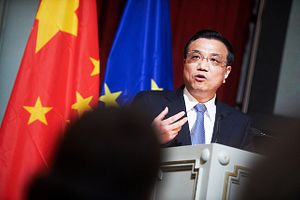This week, Chinese Premier Li Keqiang traveled to Germany, Russia and Italy to bolster political and economic ties during what Li referred to as a “global economic recession.” As Europe struggles to recover from its debt crisis and Russia attempts to overcome sanctions that have crippled its economy, China is also facing the threat of a slowdown. Stronger ties among China and Russia, Germany, and Italy could help to boost their economies over time.
Li met with German Chancellor Angela Merkel at the China-Germany Economic and Technical Cooperation Forum in Berlin, where guidelines for bilateral cooperation were laid out. Both Li and Merkel vowed to enhance China-Germany relations through innovative and fair cooperation. Trade, investment and technological cooperation deals were signed. Germany has emerged from Europe’s debt crisis in better condition than Southern European nations, but challenges to growth remain across the eurozone.
Meetings with President Giorgio Napolitano and Prime Minister Matteo Renzi in Italy resulted in resolutions to expand investment ties. Li signed 20 trade agreements with Italy worth $10.3 billion, while encouraging Italy to export more goods to China to reduce the latter’s bilateral trade surplus. Renzi has sought an increase of Chinese investment in Italy to help combat the Italian economic malaise.
Li also met with Russian Prime Minister Dmitry Medvedev and Russian President Vladimir Putin in Moscow, where they discussed ways to strengthen economic ties between the two nations in the midst of Western sanctions on Russia over the crisis in Ukraine. Thirty-eight agreements were signed during the meeting as Russia sought to expand trade and finance ties. This represents a positive step forward in relations between the two nations, which have occasionally been marked by uncertainty over competition for influence in Central Asia, and over Russia’s commitment to honoring energy agreements with China.
A compromise struck in the summer of 2013 regarding an oil export agreement suggested economic relations between China and Russia were improving. Rosneft, a Russian state-owned energy enterprise, committed to double oil supplies to China at low prices in 2013, and sold a large stake in the Vankor oilfields to China National Petroleum Corporation (CNPC) one year later. At the same time, however, CNPC had yet to make a $25 billion prepayment to Gazprom, associated with an agreement made in May of this year, demonstrating China’s hesitance to finance its Asian neighbor.
At this week’s meetings, some of that hesitance appeared to have been overcome. Chinese banks, including China Exim Bank and China Development Bank, agreed to extend more than $4.5 billion to Russian companies. In addition, the new gas deal signed this week is larger than the one agreed in May. A currency swap deal of $25 billion to facilitate trade was also concluded. Another agreement included a project to build a high-speed railway between Kazan and Moscow, as a pilot program in building a railway to span Kazakhstan, Russia and China. Projects spanning trade, advanced technology, and satellite navigation were also approved. These deals promise to alleviate pressures placed on Russia as a result of economic sanctions imposed by the West, as well as a decline in growth.
Li’s tour highlights the major challenges facing these countries. While Germany remains economically strong, as a producer and exporter of high-value added products, China, Italy and Russia must overcome structural barriers to economic growth. China, for its part, currently faces a large debt burden incurred mainly by its corporate sector and local governments. At the same time, the nation is attempting to move away from a low value-added manufacturing model of growth to a high value-added manufacturing and service-based economy. Italy faces major challenges pulling out of its debt distress, with the most difficult issue its underlying need for economic restructuring. Finally, Russia faces not only economic sanctions, but serious challenges to the expansion of its market economy. Institutions favoring rent-oriented firms have stalled the growth of the private economy, with a lack of competition, corruption, and inefficiency posing barriers to market expansion.
It is hopeful that the agreements resulting from Li’s tour will bolster growth in these countries. The agreements work in part to facilitate restructuring, focusing to some extent on economic upgrading and innovation, as between China and Germany and China and Russia, the building of infrastructure to complement industry growth, as between China and Russia, and investment, as between China and all three nations. The lion’s share of the restructuring onus still falls on the shoulders of each nation, however, and the difficulty of the task may mean that Li’s Recession Tour won’t be his last.

































